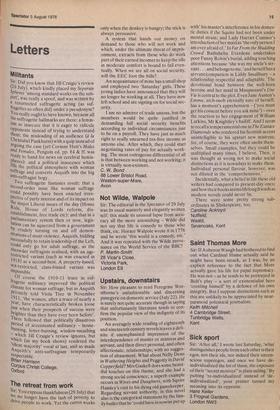Upstairs, downstairs
Sir: How pleasant to read Peregrine Worsthorne's unfashionable and discerning panegyric on domestic service (July 22). He is surely not quite accurate though in saying that unfortunately literature tends to confirm the popular view of the indignity of its position.
An averagely wide reading of eighteenth and nineteenth century novels leaves a definite if unemphasised impression of the interdependence of master or mistress and servant, and their direct personal, and often affectionate, relationships; with no suggestion of abasement. What about Nelly Dean in Wuthering Heights and Peggotty in David Copperfield? Mrs Gaskell does some beautiful touches on this theme, and she had a strong social conscience; a superb example occurs in Wives and Daughters, with Squire Hamley's visit to his dying old gamekeeper. Regarding servant authority, in this novel also is the categorical statement by the family butler that he 'could have in nowise put up with' his master's interference in his domestic duties if the Squire had not been under mental strain; and Lady Harriet Cumnor's Introduction of her maid as 'the only person! am ever afraid of.' In Far From the Madding Crowd Bathsheba Everdene undertakes poor Fanny Robin's burial, adding touching attentions because 'she was my uncle's servant . . . and belongs to me,' and herself has a servant/companion in Liddy Smallbury — a relationship respectful and adaptable. The devotional bond between the well-born heroine and her maid in Maupassant's Une Vie is central to the plot. Even Jane Austen's Emma, arch-snob eternally sure of herself, has a moment's apprehension — ('you must get his consent before you ask mine') —over the reaction to her engagement of William Larkins, Mr Knightley's bailiff. And I seem to recall a temperamental one in The Eustace Diamonds who rendered his Scottish accent unintelligible to his upstart new mistress; for, of course, they were often snobs themselves. Small examples, but they could be multiplied many times, I believe. Then, it was thought as wrong not to make social distinctions as it is nowadays to make them. Individual personal flavour, however, was not diluted in the 'comprehensives.'
Incidentally, what a belief in life these old writers had compared to present-day ones; and how their books seems lifelongfriends as modern novels could never be.
There were some pretty strong subordinates in Shakespeare, too.
Caroline Ackroyd
Nutfield, Weald, Sevenoaks, Kent






























 Previous page
Previous page